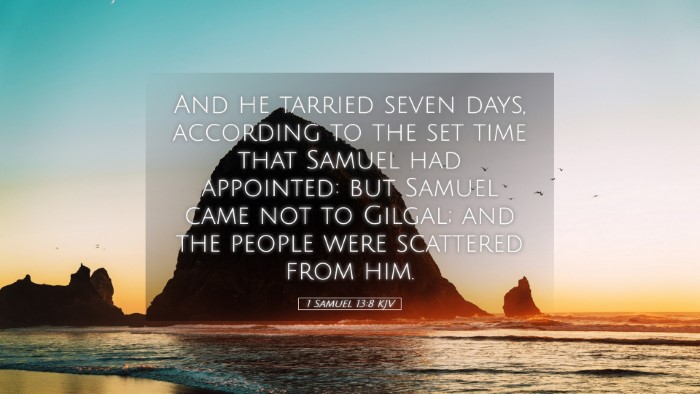Commentary on 1 Samuel 13:8
Bible Verse: 1 Samuel 13:8 - "He waited seven days, the time set by Samuel; but Samuel did not come to Gilgal, and Saul's men began to scatter."
Introduction
1 Samuel 13:8 is a critical verse in the narrative of Saul's kingship and gives a profound insight into his character and leadership. The events described are illustrative of issues of obedience, faith, and the timing of God. In this commentary, we will draw from insights of prominent public domain commentators including Matthew Henry, Albert Barnes, and Adam Clarke.
Contextual Background
This verse occurs in a period of great tension in Israel, as Saul, the first king, faced threats from the Philistines. The surrounding context is essential for understanding the gravity of Saul's actions and the implications for his reign.
Analysis of the Verse
The verse emphasizes Saul's waiting for Samuel, which indicates an expectation of divine guidance through prophetic leadership. However, the mention of his men beginning to scatter highlights Saul's growing anxiety. This situation unfolds three key themes:
- Obedience and Impatience: Saul was commanded to wait for Samuel to offer sacrifices, a role that Samuel held as the prophet. His impatience and subsequent actions led to dire consequences.
- Leadership Challenges: The dispersion of Saul's men illustrates the vulnerability of leadership under pressure and the difficulties in maintaining morale amidst uncertainty.
- The Consequences of Presumption: Saul's decision to act without Samuel reflected a grave miscalculation that would cost him dearly (1 Samuel 13:13-14).
Insights from Matthew Henry
Matthew Henry elaborates on the implications of Saul’s impatience. He describes waiting as an act of faith and obedience, taking Samuel's delay as a test of Saul's character. Henry asserts:
"Saul’s waiting was a clear manifestation of his acknowledgment of God’s appointed means for guidance; however, the moment he deviated from that expectation, he sowed the seeds of his own downfall."
Henry further highlights that the pressure to act came from what he deemed urgent, pointing out how often leaders act on impulse rather than seeking divine direction.
Insights from Albert Barnes
Albert Barnes provides a forensic look at the social dynamics at play in Saul’s camp. He notes:
"The gathering of the men around Saul underlines their loyalty, yet their imminent scattering signifies the potential for discontent when faced with unforeseen hardships. Saul’s poor decision stemmed from a lack of trust in God’s timing."
Barnes emphasizes the importance of waiting on God, posing it as a challenge for believers: the temptation to act prematurely can lead to ungodly actions with lasting repercussions.
Insights from Adam Clarke
Adam Clarke focuses on the character of Saul and the weight of his responsibility as king. He writes:
"Saul’s actions reveal a man caught between duty and the pressures of leading a people in crisis. His outward actions of offering sacrifices were an attempt to salvage the situation, yet they came at the cost of disobedience."
Clarke argues that the scattering of Saul's men was a direct reflection of Saul's failure to model faith and patience. The role of a leader is vital in times of crisis, and Saul's misstep illustrates the costly nature of neglecting divine instructions.
Theological Reflections
From this passage, we can extract several theological reflections that speak to our contemporary faith experience:
- The Nature of God’s Timing: God's timing in our lives is often a test of faith. Patience is a fruit of the Spirit that we must cultivate amidst trials.
- The Importance of Obedience: The call for obedience is a central theme throughout scripture. Timing without obedience is perilous.
- Leadership and Accountability: Those who lead must remain accountable to God’s commands, as deviation can lead not only to personal but to communal disaster.
Conclusion
1 Samuel 13:8 serves as a poignant reminder of the struggles inherent in leadership, particularly in relation to faith and obedience. The lessons drawn from the commentaries of Henry, Barnes, and Clarke offer both practical and spiritual insights that resonate across time. As pastors, students, and theologians reflect on this verse, may they be encouraged to foster patience, to prioritize obedience, and to lead with a heart attuned to God's timing.


